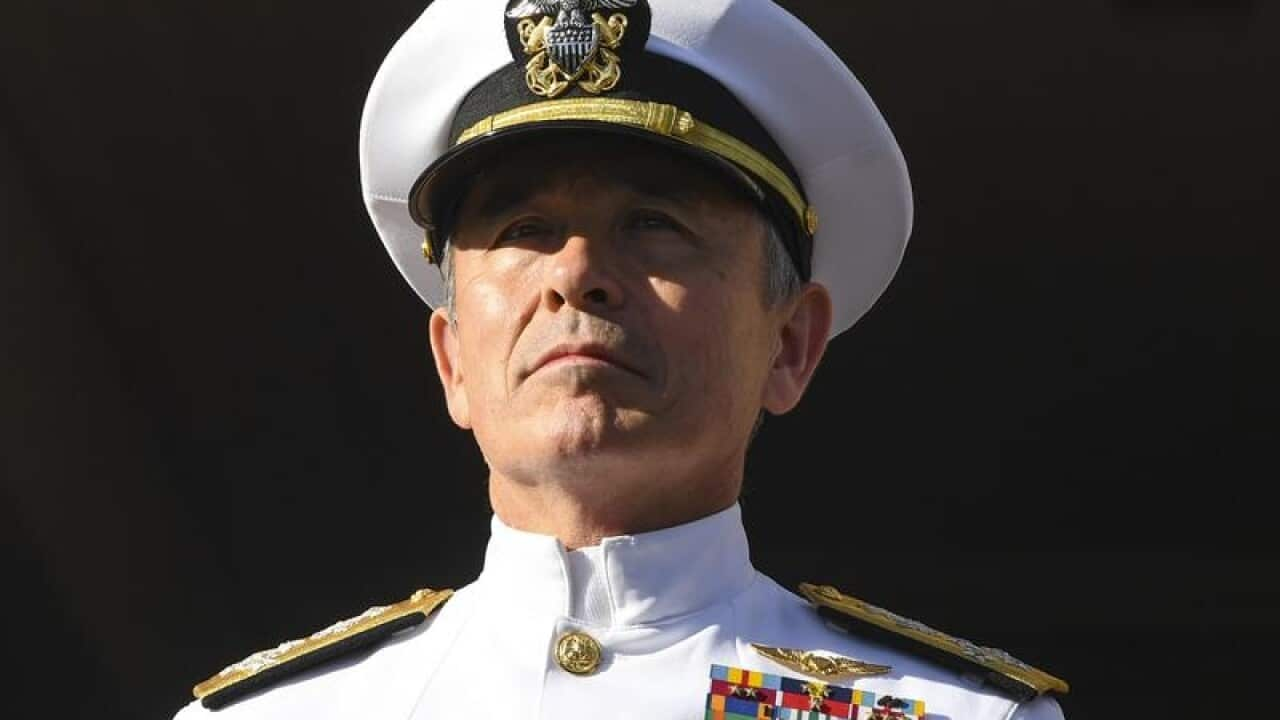The White House has backtracked on its appointment of Admiral Harry Harris as the United States' next ambassador to Australia, with senior Trump administration figures instead recommending the celebrated military leader serve as ambassador to South Korea.
Australia's foreign minister Julie Bishop confirmed her US counterparts told her of the change yesterday.
"Acting Secretary of State John Sullivan confirmed that the White House administration had decided to reassign Admiral Harris to another post,' Ms Bishop told reporters in Sydney.
"We understand, this sort of thing happens."
The head of the US Pacific Command was nominated by US President Donald Trump in February to fill the longtime vacant US Ambassador to Australia role, but his appearance before a congressional committee in Washington DC on Tuesday was suddenly postponed.
Then word leaked out the man Mr Trump wants to be the next US Secretary of State, CIA Director Mike Pompeo, wants Admiral Harris to fill the key post of ambassador to South Korea.
Ms Bishop said she was confident the appointment of a new Australian ambassador would be a "priority" for Mr Pompeo after his appointment.
"We also understand the challenges the United States has on the Korean peninsular," Ms Bishop said.
Dr Brendan Nelson, director of the Australian War Memorial and a former Liberal minister, said he would not describe the backflip as a diplomatic "snub" but urged President Trump to find a replacement quickly.
"I say to President Trump and those who are advising him: We need an ambassador, we deserve an ambassador and we’d like one soon," Dr Nelson said, speaking with Sky News on Anzac Day.
"A visit to the Australian War Memorial will remind anyone, including Americans, why we are allies and not just good friends," he said.
A White House official told Washington Post Mr Trump was also keen for a switch, although no names were offered on who could fill the still vacant Canberra role.
Prime minister Malcolm Turnbull praised Admiral Harris' appointment in February. He tweeted a photo of the two men together saying “look forward to seeing you in Canberra, Harry’’.
Unlike many of Mr Trump's other nominations, Admiral Harris was expected to cruise through the congressional confirmation hearings for the Australian gig.
Admiral Harris was also full of praise for Australia after his nomination was made public.
"Australia is one of the keys to a rules based international order," Admiral Harris, in testimony before the US House Armed Services Committee in February, said.
"They are a key ally of the United States and they have been with us in every major conflict since World War One."
Admiral Harris' nomination will likely not be appreciated by China and North Korea.
The 61-year-old is a China hawk and has controversial theories about North Korea.
He believes North Korean leader Kim Jong-un was pursuing a nuclear arsenal not just to safeguard his rogue regime, but to blackmail South Korea and other countries into reunifying the Korean peninsula into a single Communist nation.
"He is after what his grandfather failed to do and his father failed to do," Admiral Harris testified in February.
The admiral also told the committee China had built "vertically and dramatically" seven new military bases on the Spratly Islands, where China, Taiwan, Vietnam, Brunei, Malaysia, and the Philippines each claim sovereignty.
He also encourages "our friends, allies and partners" to conduct freedom of navigation operations in the area despite upsetting China.
"If they (allies) are operating in the South China Sea that demonstrates to the world the South China Sea is in fact international water space and it is not simply because it has China in its name," Admiral Harris told the committee.
He said he was "deeply concerned about China's heavy investments into the next wave of military technologies, including hypersonic missiles, advanced space and cyber capabilities, and artificial intelligence" and warned if the US does not keep pace it will struggle to compete with China on future battlefields.
Admiral Harris added he was concerned "a cult of personality" in China was growing around President Xi Jinping.
Mr Pompeo is also facing a battle to be approved by Congress for the US Secretary role.

